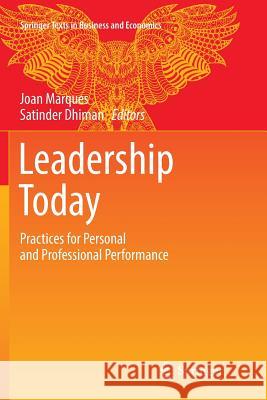Leadership Today: Practices for Personal and Professional Performance » książka



Leadership Today: Practices for Personal and Professional Performance
ISBN-13: 9783319809472 / Angielski / Miękka / 2018 / 419 str.
Leadership Today: Practices for Personal and Professional Performance
ISBN-13: 9783319809472 / Angielski / Miękka / 2018 / 419 str.
(netto: 383,36 VAT: 5%)
Najniższa cena z 30 dni: 327,68
ok. 16-18 dni roboczych.
Darmowa dostawa!
Part I Soft Skills.- Ch 1 Leadership and Purpose.- Ch 2 Leadership and Trust.- Ch 3 Leadership and Moral Behavior.- Ch 4 Leadership and Values.- Ch 5 Leadership and Vision.- Ch 6 Leadership and Authenticity.- Ch 7 Leadership and Emotional Intelligence.- Ch 8 Leadership and Spirituality.- Ch 9 Leadership and Sustainability.- Ch 10 Leadership and Mindfulness.- Ch 11 Leadership and Empathy.- Ch 12 Leadership and Motivation.- Ch 13 Leadership and Communication.- Ch 14 Leadership and Dependability.- Ch 15 Leadership and Creativity.- Ch 16 Leadership and Initiative.- Ch 17 Leadership and Self-Confidence.- Ch 18 Leadership and Resilience.- Ch 19 Leadership and Perseverance.- Part II Hard Skills.- Ch 20 Leadership and Ambition.- Ch 21 Leadership and Global Understanding.- Ch 22 Leadership and Information Technology.- Ch 23 Leadership and Planning.
Joan Marques, PhD, EdD, serves as Assistant Dean of Woodbury University’s School of Business, Chair and Director of the BBA Program, and Professor of Management. Her teaching focuses on leadership, ethics, and organizational behavior, and her research interests pertain to the same areas with specific focus on workplace spirituality and leadership awareness. She has been widely published in prestigious scholarly journals such as Journal of Business Ethics, Journal of Management Development, Business and Society, Journal of Organizational Analysis, Organization Development Journal, Human Resource Development Quarterly, Journal of Global Responsibility, Journal of Communication Management, International Journal of Organizational Analysis, and many others.
Satinder Dhiman, PhD, EdD, currently serves as a Professor of Management and as the Associate Dean, Chair, and Director of the MBA Program at Woodbury University’s School of Business in Burbank, California. Professor Dhiman has also served as the Chair for a special MBA Program for Mercedes-Benz executives, China. He also serves as Accreditation Mentor ans Site Team Leader for Accreditation Council for Business Schools and Programs (ACBSP) for various universities in America, Canada, Europe, and India. He has been recently elected as the President of International Chamber for Service Industry (ICSI), 2014-2016. He has also completed advanced Executive Leadership Programs at Hartford, Standford, and Wharton.
Recipient of several national and international academic and professional honors, Dr. Dhiman won the Woodbury University Ambassador of the Year Award 2015; Steve Allen Excellence in Education Award in 2006, and the prestigious ACBSP International Teacher of the Year Award in 2004. In 2013, Dr. Dhiman was invited to be the opening speaker at the prestigious TeDx Conference @ College of the Canyons in Santa Clarita, California. He is the founder and Director of Forever Fulfilled, a Los Angeles-based Wellbeing Consultancy that focuses on workplace wellness and self-leadership,
Dr. Dhiman' work has been published in multiple national and international journals, and he has authored, co-authored, and co-edited ten books on management and leadership over the last 7 years. His current research on fulfillment, which is also the theme of his book, Seven Habits of Highly Fulfilled People (Personhood Press, CA, 2012/.20145), is focused on transformative habits of the mind for attaining lasting joy and fulfillment in both personal and professional life. In his most recent book, Ghandhi and Leadership (Palgrave Macmillan, USA, 2015), Dr. Dhiman offers perceptive insights into the spiritual and moral mainstay of Gandhi's exemplary leadership and its abiding influence on the world today.
This textbook provides a clear understanding of leadership needs in today’s business world, explained within the scope of hard and soft leadership skills. It captures qualities and skills such as spirituality, empathy, moral behavior, mindfulness, empathy, problem solving, self-confidence, ambition, knowledge, global understanding, and information technology. This text explains and provides guidelines for the implementation of each skill and includes examples from contemporary and historical leaders inviting the reader to consider each quality and engage in self-reflection. This book deviates from excessive theoretical descriptions presenting a timely, hands-on approach to leadership.
Even though leadership, as a phenomenon, has been studied extensively in the past decades, it remains a challenge as times, needs, and perceptions change and the world increasingly merges into a global village. Numerous leadership styles have been developed, varying from resonant, servant, and laissez faire, to authentic, authoritative, and coercive; from charismatic and team, to transformational and transactional leadership. And while each leadership style harbors a wealth of qualities, strategies, and behavioral guidelines toward successful implementation, there are critical overarching themes that keep emerging, regardless of the “label” one chooses.
In recent years, an important distinction has been established in leadership qualities: soft and hard skills. Soft skills are reflective in nature, and entail qualities such as empathy, motivation, self-awareness, self-regulation, and social skills. In leadership performance, the application of soft skills entails a combination of interpersonal and social skills. Hard skills are more of a measurable nature. They encompass analytical and technical skills. Both soft and hard skills are important for leaders because they complement one another.
Featuring contributions form academics and professionals from around the world, this text will be of interest to students, researchers, professionals in business and leadership who aspire to lead beyond their immediate environment.
1997-2026 DolnySlask.com Agencja Internetowa
KrainaKsiazek.PL - Księgarnia Internetowa









